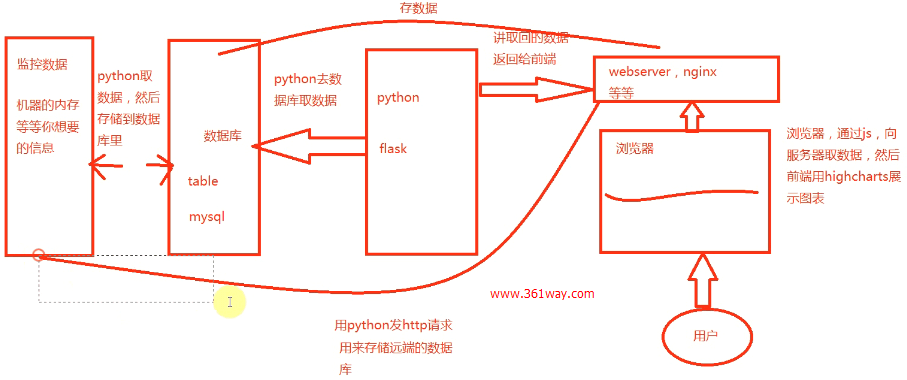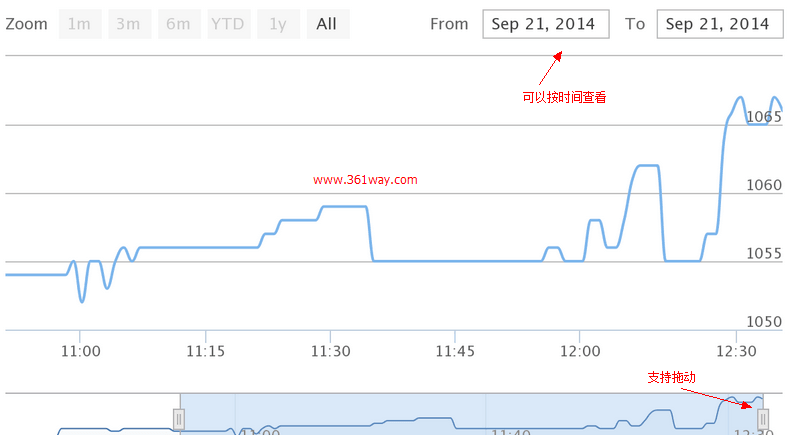这里以监控内存使用率为例,写的一个简单demo性程序,具体操作根据51reboot提供的教程写如下。
一、建库建表
创建falcon数据库:
mysql> create database falcon character set utf8; Query OK, 1 row affected (0.00 sec)
创建内存监控使用的表stat,表结构如下:
CREATE TABLE `stat` ( `id` int(11) unsigned NOT NULL AUTO_INCREMENT, `host` varchar(256) DEFAULT NULL, `mem_free` int(11) DEFAULT NULL, `mem_usage` int(11) DEFAULT NULL, `mem_total` int(11) DEFAULT NULL, `load_avg` varchar(128) DEFAULT NULL, `time` bigint(11) DEFAULT NULL, PRIMARY KEY (`id`), KEY `host` (`host`(255)) ) ENGINE=InnoDB AUTO_INCREMENT=0 DEFAULT CHARSET=utf8;
二、flask web端设置
首先我们设计一个web服务,实现如下功能:
完成监控页面展示
接受POST提交上来的数据
提供json数据GET接口
具体框架结构图如下:

目录结构如下:
web ├── flask_web.py └── templates └── mon.html
flask_web代码如下:
import MySQLdb as mysql
import json
from flask import Flask, request, render_template
app = Flask(__name__)
db = mysql.connect(user="361way", passwd="123456", \
db="falcon", charset="utf8")
db.autocommit(True)
c = db.cursor()
@app.route("/", methods=["GET", "POST"])
def hello():
sql = ""
if request.method == "POST":
data = request.json
try:
sql = "INSERT INTO `stat` (`host`,`mem_free`,`mem_usage`,`mem_total`,`load_avg`,`time`) VALUES('%s', '%d', '%d', '%d', '%s', '%d')" % (data['Host'], data['MemFree'], data['MemUsage'], data['MemTotal'], data['LoadAvg'], int(data['Time']))
ret = c.execute(sql)
except mysql.IntegrityError:
pass
return "OK"
else:
return render_template("mon.html")
@app.route("/data", methods=["GET"])
def getdata():
c.execute("SELECT `time`,`mem_usage` FROM `stat`")
ones = [[i[0]*1000, i[1]] for i in c.fetchall()]
return "%s(%s);" % (request.args.get('callback'), json.dumps(ones))
if __name__ == "__main__":
app.run(host="0.0.0.0", port=8888, debug=True)
这里使用的汇图JS为highcharts、highstock ,具体模板页面内容如下:
[root@91it templates]# cat mon.html
<title>memory monitor</title>
<!DOCTYPE HTML>
<html>
<head>
<meta http-equiv="Content-Type" content="text/html; charset=utf-8">
<title>Highstock Example</title>
<!-- <script type="text/javascript" src="{{ url_for('static', filename='jquery.min.js') }}"></script> -->
<script type="text/javascript" src="http://ajax.useso.com/ajax/libs/jquery/1.8.2/jquery.min.js"></script>
<style type="text/css">
${demo.css}
</style>
<script type="text/javascript">
$(function () {
$.getJSON('/data?callback=?', function (data) {
// Create the chart
$('#container').highcharts('StockChart', {
rangeSelector: {
inputEnabled: $('#container').width() > 480,
selected: 1
},
title: {
text: 'memory monitor'
},
series: [{
name: 'memory monitor',
data: data,
type: 'spline',
tooltip: {
valueDecimals: 2
}
}]
});
});
});
</script>
</head>
<body>
<!-- <script src="{{ url_for('static', filename='highstock.js') }}"></script> -->
<script src="http://cdnjs.cloudflare.com/ajax/libs/highstock/2.0.4/highstock.js"></script>
<!-- <script src="{{ url_for('static', filename='exporting.js') }}"></script> -->
<script src="http://code.highcharts.com/modules/exporting.js"></script>
<div id="container" style="height: 400px"></div>
</body>
</html>
注:这里的JS代码都直接使用互联网上的代码,如果主机无法连接互联网的,可以将上面的三段代取取下来,在templates 的同级目录创建static 目录,将下载下来的三个文件放到该目录,删除模板中三处引用javascript处的代码,使用当前注释的三段。
三、agent被监控端设置
web展示页面完成了,运行起来:python flask_web.py 监听在8888端口上。我们需要做一个agent来采集数据,并通过post方法请求flask_web页面,将数据上传写入数据库。这里以监控内存为例,具体监控代码如下:
#!/usr/bin/env python
#coding=utf-8
import inspect
import time
import urllib, urllib2
import json
import socket
class mon:
def __init__(self):
self.data = {}
def getTime(self):
return str(int(time.time()) + 8 * 3600)
def getHost(self):
return socket.gethostname()
def getLoadAvg(self):
with open('/proc/loadavg') as load_open:
a = load_open.read().split()[:3]
return ','.join(a)
def getMemTotal(self):
with open('/proc/meminfo') as mem_open:
a = int(mem_open.readline().split()[1])
return a / 1024
def getMemUsage(self, noBufferCache=True):
if noBufferCache:
with open('/proc/meminfo') as mem_open:
T = int(mem_open.readline().split()[1])
F = int(mem_open.readline().split()[1])
B = int(mem_open.readline().split()[1])
C = int(mem_open.readline().split()[1])
return (T-F-B-C)/1024
else:
with open('/proc/meminfo') as mem_open:
a = int(mem_open.readline().split()[1]) - int(mem_open.readline().split()[1])
return a / 1024
def getMemFree(self, noBufferCache=True):
if noBufferCache:
with open('/proc/meminfo') as mem_open:
T = int(mem_open.readline().split()[1])
F = int(mem_open.readline().split()[1])
B = int(mem_open.readline().split()[1])
C = int(mem_open.readline().split()[1])
return (F+B+C)/1024
else:
with open('/proc/meminfo') as mem_open:
mem_open.readline()
a = int(mem_open.readline().split()[1])
return a / 1024
def runAllGet(self):
#自动获取mon类里的所有getXXX方法,用XXX作为key,getXXX()的返回值作为value,构造字典
for fun in inspect.getmembers(self, predicate=inspect.ismethod):
if fun[0][:3] == 'get':
self.data[fun[0][3:]] = fun[1]()
return self.data
if __name__ == "__main__":
while True:
m = mon()
data = m.runAllGet()
print data
req = urllib2.Request("http://test.361way.com:8888", json.dumps(data), {'Content-Type': 'application/json'})
f = urllib2.urlopen(req)
response = f.read()
print response
f.close()
time.sleep(60)
nohup python moniItems.py >/dev/null 2>&1 & 在被监控主机上运行,如果出于实验目的,想尽快的看到展示效果,可以将time.sleep(60) 改为time.sleep(2) ,这样每2秒就会取一次数据写入数据库。
访问 http://test.361way.com:8888 就可以看到我们的监控数据了:效果图如下

highcharts支持将按时间拖动,也支持按指定时间段查看。并且查看到的图片可以直接保存为png、jpg或pdf、csv等格式查看。
 Merging Lists in Python: Choosing the Right MethodMay 14, 2025 am 12:11 AM
Merging Lists in Python: Choosing the Right MethodMay 14, 2025 am 12:11 AMTomergelistsinPython,youcanusethe operator,extendmethod,listcomprehension,oritertools.chain,eachwithspecificadvantages:1)The operatorissimplebutlessefficientforlargelists;2)extendismemory-efficientbutmodifiestheoriginallist;3)listcomprehensionoffersf
 How to concatenate two lists in python 3?May 14, 2025 am 12:09 AM
How to concatenate two lists in python 3?May 14, 2025 am 12:09 AMIn Python 3, two lists can be connected through a variety of methods: 1) Use operator, which is suitable for small lists, but is inefficient for large lists; 2) Use extend method, which is suitable for large lists, with high memory efficiency, but will modify the original list; 3) Use * operator, which is suitable for merging multiple lists, without modifying the original list; 4) Use itertools.chain, which is suitable for large data sets, with high memory efficiency.
 Python concatenate list stringsMay 14, 2025 am 12:08 AM
Python concatenate list stringsMay 14, 2025 am 12:08 AMUsing the join() method is the most efficient way to connect strings from lists in Python. 1) Use the join() method to be efficient and easy to read. 2) The cycle uses operators inefficiently for large lists. 3) The combination of list comprehension and join() is suitable for scenarios that require conversion. 4) The reduce() method is suitable for other types of reductions, but is inefficient for string concatenation. The complete sentence ends.
 Python execution, what is that?May 14, 2025 am 12:06 AM
Python execution, what is that?May 14, 2025 am 12:06 AMPythonexecutionistheprocessoftransformingPythoncodeintoexecutableinstructions.1)Theinterpreterreadsthecode,convertingitintobytecode,whichthePythonVirtualMachine(PVM)executes.2)TheGlobalInterpreterLock(GIL)managesthreadexecution,potentiallylimitingmul
 Python: what are the key featuresMay 14, 2025 am 12:02 AM
Python: what are the key featuresMay 14, 2025 am 12:02 AMKey features of Python include: 1. The syntax is concise and easy to understand, suitable for beginners; 2. Dynamic type system, improving development speed; 3. Rich standard library, supporting multiple tasks; 4. Strong community and ecosystem, providing extensive support; 5. Interpretation, suitable for scripting and rapid prototyping; 6. Multi-paradigm support, suitable for various programming styles.
 Python: compiler or Interpreter?May 13, 2025 am 12:10 AM
Python: compiler or Interpreter?May 13, 2025 am 12:10 AMPython is an interpreted language, but it also includes the compilation process. 1) Python code is first compiled into bytecode. 2) Bytecode is interpreted and executed by Python virtual machine. 3) This hybrid mechanism makes Python both flexible and efficient, but not as fast as a fully compiled language.
 Python For Loop vs While Loop: When to Use Which?May 13, 2025 am 12:07 AM
Python For Loop vs While Loop: When to Use Which?May 13, 2025 am 12:07 AMUseaforloopwheniteratingoverasequenceorforaspecificnumberoftimes;useawhileloopwhencontinuinguntilaconditionismet.Forloopsareidealforknownsequences,whilewhileloopssuitsituationswithundeterminediterations.
 Python loops: The most common errorsMay 13, 2025 am 12:07 AM
Python loops: The most common errorsMay 13, 2025 am 12:07 AMPythonloopscanleadtoerrorslikeinfiniteloops,modifyinglistsduringiteration,off-by-oneerrors,zero-indexingissues,andnestedloopinefficiencies.Toavoidthese:1)Use'i


Hot AI Tools

Undresser.AI Undress
AI-powered app for creating realistic nude photos

AI Clothes Remover
Online AI tool for removing clothes from photos.

Undress AI Tool
Undress images for free

Clothoff.io
AI clothes remover

Video Face Swap
Swap faces in any video effortlessly with our completely free AI face swap tool!

Hot Article

Hot Tools

SublimeText3 English version
Recommended: Win version, supports code prompts!

DVWA
Damn Vulnerable Web App (DVWA) is a PHP/MySQL web application that is very vulnerable. Its main goals are to be an aid for security professionals to test their skills and tools in a legal environment, to help web developers better understand the process of securing web applications, and to help teachers/students teach/learn in a classroom environment Web application security. The goal of DVWA is to practice some of the most common web vulnerabilities through a simple and straightforward interface, with varying degrees of difficulty. Please note that this software

Dreamweaver Mac version
Visual web development tools

Zend Studio 13.0.1
Powerful PHP integrated development environment

Dreamweaver CS6
Visual web development tools






